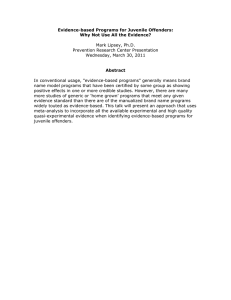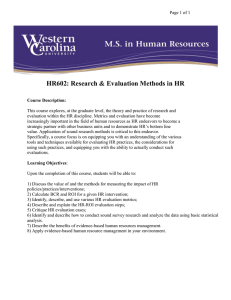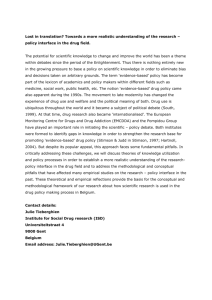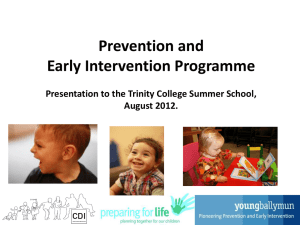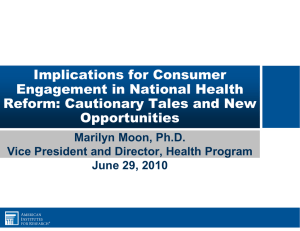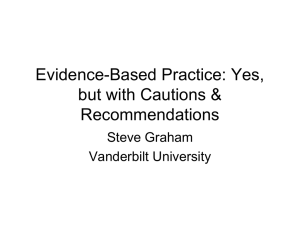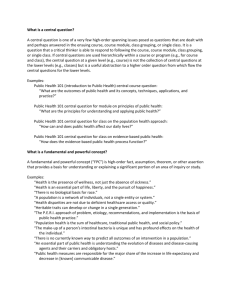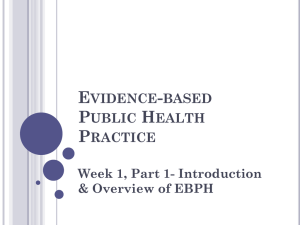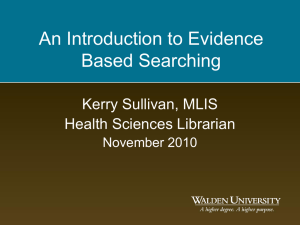Evidence Based Policy: Whence it Came and Where it’s Going William Solesbury
advertisement
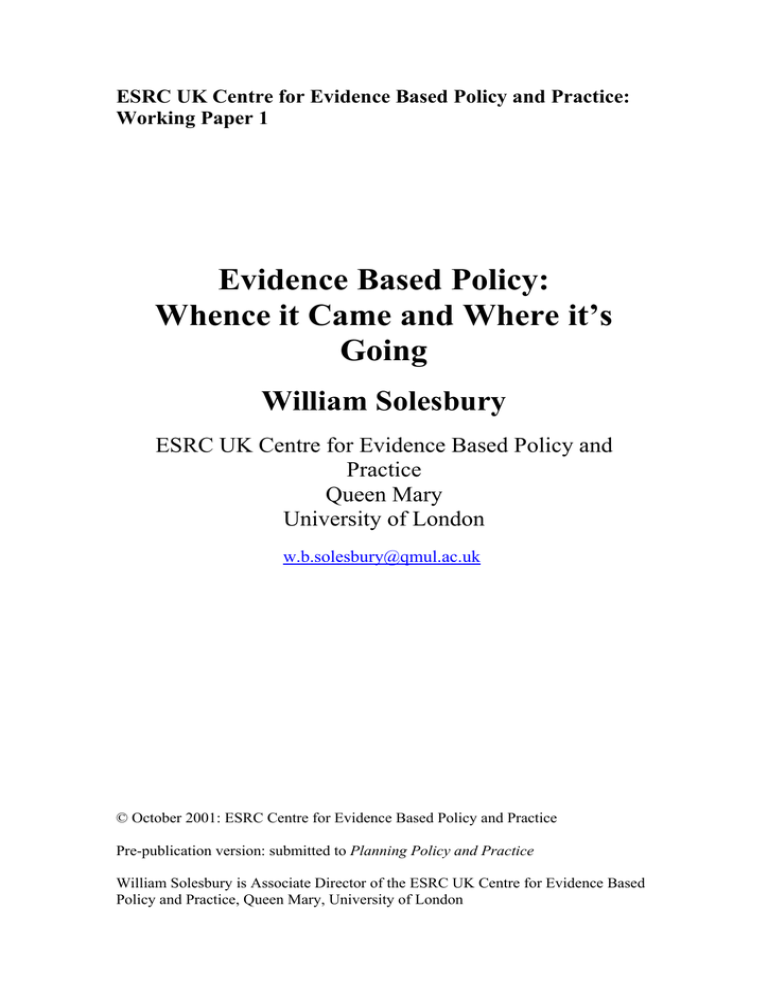
ESRC UK Centre for Evidence Based Policy and Practice: Working Paper 1 Evidence Based Policy: Whence it Came and Where it’s Going William Solesbury ESRC UK Centre for Evidence Based Policy and Practice Queen Mary University of London w.b.solesbury@qmul.ac.uk © October 2001: ESRC Centre for Evidence Based Policy and Practice Pre-publication version: submitted to Planning Policy and Practice William Solesbury is Associate Director of the ESRC UK Centre for Evidence Based Policy and Practice, Queen Mary, University of London Abstract This short paper looks at reasons why the UK, in particular, has seen an upsurge of interest in evidence-based policy and practice. It notes the utilitarian turn in research funding policy towards economic and social priorities and the provision of research results that are both useful and useable. This encompasses an increased interest in the fuller exploitation of existing data and research findings. Practitioners are also showing a greater interest in demonstrating the efficacy of particular practices, perhaps as a result of the loss of public confidence in many professions in recent years. And, at the policy level, the evidence-based approach has been given a significant boost by the advent of a Labour government with a pragmatic, antiideological stance. ‘What works?’ is now the watchword, but there are many different kinds of evidence that might answer the question. Research findings are only one. Moreover, there is a close relationship between evidence (or knowledge) and power in which evidence may be used both to strengthen power and influence, and to challenge them. Although the evidence-based approach to policy and practice offers the research community major new opportunities, it would be wise to remain modest in its claims to improve the conduct of public affairs. Key words: Evidence-based; Policy; Practice The purpose of the Working Paper series of the ESRC UK Centre for Evidence Based Policy and Practice is the early dissemination of outputs from Centre research and other activities. Some titles may subsequently appear in peer reviewed journals or other publications. In all cases, the views expressed are those of the author(s) and do not necessarily represent those of the ESRC. 2 3 Evidence Based Policy:Whence it Came and Where it’s Going The ascendancy of evidence There was a time when ‘evidence’ was what detectives looked for in making up their minds. As Sherlock Holmes said, ‘It is a capital mistake to theorise before you have all the evidence. It biases the judgement1.’ But nowadays, seemingly, ‘evidence’ is as necessary to political conviction as it is to criminal conviction. This concept of ‘evidence-based policy’ has been gaining currency over the last decade. The 1999 White Paper on Modernising government clearly adopted it as part of its philosophy: This Government expects more of policy makers. More new ideas, more willingness to question inherited ways of doing things, better use of evidence and research in policy making and better focus on policies that will deliver long term goals.2 And now that the agenda has moved on to a concern with policy delivery3 as much as with policy development, there is an equal concern for practice to be informed by evidence. In Whitehall (and in Edinburgh, Cardiff and Belfast), in local authorities, quangos, the National Heath Service, in voluntary agencies and professional associations there is a new thirst for knowledge. Research budgets are expanding, new analytical staff are being recruited, it is boom time for contract research and consultancy, good practice guidance fills websites, publications and workshop programmes. Why has all this happened now? And most especially in Britain? Some will argue that there is nothing new here. We are re-engaging in long-standing debates about knowledge and power, rationality and politics, democracy and technocracy. Even so, the questions why now? why here? still arise. Is there something in the UK worlds of research, of practice or of policy that has impelled the ascendancy of a concern with the role of evidence in public policy and practice? The utilitarian turn in research From the research perspective, more particularly that of social science, there has been a (re)turn in the last decade to doing useful research, research that helps us not just to understand society but offers some guidance on how to make it better. To a large extent this has been driven by the funders of social science. Government departments have come to be the dominant funders; the research charities – like the Joseph Rowntree Foundation and the Nuffield Foundation – have increasingly adopted an instrumental view of research, gearing it to their social priorities; and the Economic and Social Research Council (ESRC) has been subjected to the demands of government science policy that views academic research as a means to economic and social development much more than as a cultural end in itself. Researchers have perforce responded to these changed funding priorities, but there has also been a shift 4 in their mood – a wish not just to observe but to engage with society, a more pragmatic stance on matters of theory or method, a greater self-confidence in their role. In addition, there has been a commitment to make research not just useful but useable. Competition from the commercial research and consultancy sector has brought home to academic researchers the importance of conducting and communicating research in ways that ‘users’ (often actually clients who are footing the bill) find helpful. How to structure a report, write in plain English, make a five minute presentation; these are skills which are now seen to be as important as how to design a questionnaire, conduct an interview or analyse data. There is, too, a movement in the research community to exploit more fully existing data or existing research findings. This is the rationale for the ESRC’s recent initiative on evidence-based policy and practice4. Most research effort is expended on new primary research and yet, on virtually any topic you can name, there is a vast body of past research that may have some continuing value but mostly remains ignored. Social science is very bad at the cumulation and the re-use of past research results. There are sometimes good reasons why these are no longer valid; today’s context, perspective, agenda may be radically different. But too often the disregard of past research is more a matter of ignorance or fashion. Secondary analysis of existing data – which economists, in particular, have made a speciality – is one established method. Systematic reviews are something newer; methodologically rigorous exercises in assessing the findings of previous cognate research in order to synthesise the results5. The Cochrane Collaboration has pioneered this work in the medical field and it is now being extended into social policy by the Campbell Collaboration6. Both secondary analysis and systematic reviews depend on an awareness of previous research so skills in searching for existing data or findings are also important. Professional practice: retreat from priesthood Some practitioners, too, are showing a new interest in evidence. The focus of their concern has been very much on the efficacy of particular practices. In the UK health field a new infrastructure has been built dedicated to developing and evaluating new treatments; the National Institute for Clinical Excellence, the NHS Centre for Reviews and Dissemination, the National Co-ordinating Centre for Health Technology Assessment, the Health Development Agency and the Cochrane Collaboration are all part of this, as are the numerous practice reviews being commissioned externally. These developments are building on a tradition of evidence-based medicine7. This is now spilling over into new fields of professional practice like education, social work, criminal justice, regeneration and others. The book What works? Evidencebased policy and practice8, published in 2000, provides a good survey of these fields. For example, in education, the former Department for Education and Employment invested in the creation of a Centre for Evidence-informed Education Policy and Practice (EPPI Centre) in the University of London9. The charity, Barnardos, has been in the forefront of initiatives to bring a more evidential approach to practice in childcare10. The Association of Directors of Social Services has established a 5 ‘research in practice’ (RIP) initiative11. Urban regeneration is another field of burgeoning interest in good practice12. It may be that this new interest among professionals in bringing impartial evidence to bear on their practice is related to the loss of public confidence that most have suffered in recent years. Traditionally, professionals operated like a priesthood, reliant on the unquestioning faith of their followers. But patients, parents, students, clients, customers of all kinds are less and less inclined to take professional views on trust. Their ‘informed consent’ is needed to any intervention which means that professionals must be ready to explain not just what they advise and why it is appropriate, but also what they know of its likely efficacy. To have such information at their finger tips, accessible and constantly updated, practitioners need what have come to be known as knowledge management systems. Knowledge management (KM for short) is the latest organisational enthusiasm, based on the key concept that knowledge is a resource – alongside finance, technology and people – which organisations must deploy to achieve their objectives. Among the knowledge they need is not just ‘know how’ (practical experience of what works) but also ‘know what’ (the state of the world),’ know why’ (causes and explanations) and ‘know who’ (contacts and networks). Some of this organisational knowledge is explicit and documented but much is tacit, carried in people’s heads. Hence the need for knowledge management. Sophisticated information systems are part of this but equally important is the organisational culture – the willingness to share information, to be open to external influence and to be ready to learn from experience. Policy: pragmatism replaces ideology Public policy has caught up with these trends in the worlds of research and practice, endorsed and amplified them. The already noted enthusiasm of the 1999 White Paper for evidence-based policy contrasts with the near silence of its 1994 and 1995 predecessors on the Civil Service13 which had a lot to say about structures and systems, but little on strategy or style. What happened between these dates was, of course, the coming into office of New Labour. Its stance was anti-ideological and pragmatic. It had a new agenda and so new knowledge requirements. It was suspicious of many established influences on policy, particularly within the civil service, and anxious to open up policy thinking to outsiders. Hence the appointment of specialist advisers. Hence, too, the creation of new outfits like the Performance and Innovation Unit (PIU) under Geoff Mulgan (ex of the Demos think tank), the Centre for Management and Policy Studies (CMPS) under Ron Amann (formerly of the ESRC), and the Social Exclusion Unit under Moira Wallace. And hence the penchant for cross-cutting policy reviews such as that on childcare which led to the establishment of the government’s Sure Start initiative. In all these cases ‘evidence’ became a key resource in arguing their corner. A peculiarly British affair At present, evidence-based policy seems to be principally a British commitment. The underlying generic issue of how research and policy can better relate is debated in 6 other countries14 but the concept of evidence-based policy and practice has not entered into political discourse in other European or North American states. However, the recent European Commission White Paper on governance recognises that: …scientific and other experts play an increasingly significant role in preparing and monitoring decisions. From human and animal health to social legislation, the institutions rely on specialist expertise to anticipate and identify the nature of the problems and uncertainties that the Union faces, to take decisions and to ensure that risks can be explained clearly and simply to the public.15 It further declares that, in 2002, it will publish guidelines on the collection and use of expert advice so that it is clear what advice is given, where it is coming from, how it is used and what alternative views are available. It also suggests that, over time, these guidelines could form the basis for a common approach for all institutions and member states (my italics). There is, then, something about public policy and practice in Britain at present that has prompted a a renewed concern with evidence. Most working in the field probably welcome this, but let us not be too simple minded in our enthusiasm. In one version of John Maynard Keynes’ view, ‘…there is nothing a government hates more than to be well-informed; for it makes the process of arriving at decisions much more complicated and difficult.’16 We must not forget that there is more to policy and practice than the disinterested pursuit of truth and wisdom. Is what works all that matters? ‘What matters is what works’ emerged as a New Labour mantra somewhere on the journey from Opposition to Government. Once in office, getting to know what works became the rationale for vastly expanded research staffs and budgets in government departments and agencies, in the NHS and in local authorities. Much of this effort is spent on ex post evaluation; indeed the US custom of building evaluation routinely into programme designs and budgets has been widely adopted. The current evaluations of major programmes like Sure Start, the New Deals and Neighbourhood Renewal are massive enterprises undertaken by large research consortia, often drawn from both the commercial and the academic sectors. But ex post evaluations of new programmes are not the only way of discovering what works. There are other approaches to garnering such evidence that can be as informative, and may be less costly or more timely. Most programmes use one or more generic policy instruments; partnerships, public disclosure (aka naming and shaming) and zero tolerance are all current favourites. Experience in different applications may reveal the context in which they do and don’t work17. Pilot studies or social experiments, testing out a policy for a limited time or on a limited population, may be a suitably cautious approach to learning about policy impacts where outcomes are uncertain. Experience overseas may yield lessons. Having more regard to theories of human behaviour is also advisable. In short, even the question of what works can be addressed by a wider repertoire of evidence-gathering research 7 strategies than are commonly employed. And we need to be much better at cumulating the results of individual studies. But what works is not all that matters. To interpret the call for evidence-based policy and practice in these terms alone is to disregard a whole set of other important questions in policy development, like what is going on? what’s the problem? is it better or worse than…? what causes it? what might be done about it? at what cost? by whose agency? Indeed these are mostly prior questions to the question of what works, for the what works question is too bald. What works for whom in what circumstances is what policy makers and practitioners really need to know. And to answer that there needs to be not just research that is evaluative, but also research that is descriptive, analytical, diagnostic, theoretical and prescriptive. That is, an evidence base to policy in all stages of the policy cycle – in shaping agendas, in defining issues, in identifying options, in making choices of action, in delivering them and in monitoring their impact and outcomes. What counts as evidence? It is easy, especially for researchers, to elide the concepts of evidence and research, and for academic researchers to believe that only academic research counts. Or, if not that, that somehow academic research is the basis of all knowledge as the Frascati concept of a continuum of basic research-strategic research-applied researchdevelopment-application implies. In practice, evidence is more plural than research. The OED offers as a definition of evidence, ‘the available body of facts or information indicating whether a belief or proposition is true or valid’18. So availability and validity are the key issues. Ask any professional how they get to know what they need to know in their work and you get very diverse answers about the sources of their knowledge. Experience features large, both direct personal experience and that of colleagues. Most professions also have shared norms, values, ideas in good currency, sometimes articulated and made explicit, often tacit. Then there are the results of relevant research which may reach them in diverse ways. Improving how individuals, teams and organisations gather, evaluate, store and use this knowledge is what knowledge management is all about, but the chances are that – even with the most sophisticated hardware and software – the availability of all relevant knowledge is a hit and miss affair. Not all this knowledge has equal validity. The singular personal experience may leave a powerful impression, but it is still only a sample of one. Even a larger body of personal experience may be strongly context-specific but, with experience, at least the empirical basis is evident. With ideas in good currency, provenance may be quite unknown. Their power lies, dangerously, in their conventionality; ‘everybody knows that...’. In comparison, research has some potential advantages, provided that it has been conducted objectively and rigorously. With all sources of evidence, even with research, some scepticism about validity is desirable. In bringing evidence of any kind to bear on policy or practice, the key questions to be asked are threefold: how relevant is this to what we are seeking to understand or decide? how representative is this of the population that concerns us? 8 how reliable, how well-founded – theoretically, empirically – is it? These are tough but necessary tests for evidence-based policy and practice. Knowledge as power? Public policy is developed and delivered through the use of power, ultimately the coercive power of the state in the hands of democratically accountable politicians. For politicians, with their advisers and their agents, securing and retaining power is a necessary condition for the achievement of their policy objectives. There sometimes, then, seems to be a tension between power and knowledge in the shaping of policy. A similar tension exists between authority and expertise in the world of practice. Emphasising the role of power and authority at the expense of knowledge and expertise in public affairs seems cynical; emphasising the latter at the expense of the former seems naïve. Maybe the two are more complementary than conflicting19. In two cases mentioned above – the introduction by New Labour of outsiders into Whitehall, and the aspirations of the European Commission for the better governance of the EU – one can observe the use of knowledge as a means to strengthening power and influence. Equally, many of the performance management regimes developed recently in British public services have asserted the primacy of certain new measures of performance, and the evidence underpinning them, over others which may have prevailed hitherto. New evidence – new data, new theories, new perspectives – is deployed to challenge the positions of established power-holders. This interdependence of power and knowledge is perhaps more apparent if public policy and practice is conceived as a continuous discourse. For, ‘As politicians know only too well, but social scientists too often forget, public policy is made of language. Whether in written or oral form, argumentation is central in all stages of the policy process.’20 In this context, evidence is an important part of the weaponry of those engaged in the discourse. Lest this seems too crude a metaphor, bear in mind that – to be effective – weapons must be handled with care, their use confined to skilled personnel aware of their limits and capabilities.They must not be deployed casually or wastefully, and must always be used with as full regard to the risks for those who use them as to those against whom they are used. Knowledge is open to misuse quite as much as other sources of power. Policy, evidence and research What should we make of all this? There is certainly a sense in which these are re-runs of old debates but, equally, there is something new in the air which gives both a fresh urgency and a new twist to the issues around evidence-based policy. To my mind the key factor is the shift in the nature of politics; the retreat from ideology, the dissolution of class-based party politics, the empowerment of consumers. The new commitment to evidence-based policy cannot be interpreted as the long-awaited triumph of social science, at last given the recognition it deserves. It is more demand than supply-driven. Yet it does provide an astonishing new opportunity for 9 researchers in material, intellectual and political terms. Let us hope we are up to it. But let us remain modest in our claims to improve the conduct of public affairs. References 1. Doyle, Sir Arthur Conan (1979) A study in scarlet Longman: London. 156pp (Reprint of 1st edition, 1888, with an introduction; quote is in Ch. 1) 2. Cabinet Office (1999) Modernising government Stationery Office: London, Ch. 2, para. 6. Cm 4310. Available at: <http://www.cabinet-office.gov.uk/moderngov/whtpaper/index.htm> 3. Cabinet Office Performance and Innovation Unit (2001) Better policy delivery and design: a discussion paper Cabinet Office: London. 21pp. Available at: <http://www.cabinet-office.gov.uk/innovation/whatsnew/betterpolicy.shtml> 4. Known as EvidenceNetwork, this comprises a number of research sub-centres coordinated by a national centre at Queen Mary, University of London. See: <http://www.evidencenetwork.org> 5. Petticrew, Mark (2001) Systematic reviews from astronomy to zoology: myths and misconceptions British Medical Journal 13 Jan 322(7278) pp98-101. Available at: <http://www.bmj.com/cgi/content/full/322/7278/98> 6. For more on the Campbell Collaboration, see <http://campbell.gse.upenn.edu> 7. Grayson, Lesley (1997) Evidence-based medicine: an overview and guide to the literature The British Library: London. 124pp 8. Davies, Huw T O; Nutley, Sandra M; Smith, Peter C (eds) (2000) What works? Evidence-based policy and practice in public services Policy Press: Bristol. 380pp 9. See: <http://eppi.ioe.ac.uk> 10. For example, the What works series of reviews of evidence. There are details of this material in the EBP Bibliography at: <http://www.evidencenetwork.org> 11. See: <http://www.rip.co.uk> 12. Johnston, Christine (2001) The influence of evidence based policy and practice on urban regeneration activities Planning Exchange, Tontine House, 8 Gordon Street, Glasgow G1 3PL. 40pp (Dissertation submitted for MSc in Local Economic Development, University of Glasgow) 13. Cabinet Office; HM Treasury (1994) The civil service: continuity and change HMSO: London. 46pp. Cm 2627; and Cabinet Office; HM Treasury (1995) The civil service: taking forward continuity and change HMSO: London. 55pp. Cm 2748 14. For an up-to-date account of these debates, see OECD (2001) Social sciences for knowledge and decision making OECD: Paris. 212pp 15. European Commission (2001) Governance in the EU: a White Paper European Commisson: Brussels. COM(2001) 428 final. Available, with supporting material, via: <http://europa.eu.int/comm/governance/white_paper/index.htm> 16. Skidelsky, Robert (1992) John Maynard Keynes: a biography. Vol. 2: the economist as saviour, 1920-1937 Macmillan: London, p630 17. For discussion of these issues see Pawson, Ray (2001) Evidence based policy II: the promise of ‘realist synthesis’ ESRC UK Centre for Evidence Based Policy and Practice: London. 21pp. Working Paper 4. Available via the EBP Bibliography at: <http://www.evidencenetwork.org> 18. The new Oxford dictionary of English (1998) Clarendon Press: Oxford 10 19. For a discussion of this inter-dependence, see Radaelli, Claudio (1995) The role of knowledge in the policy process Journal of European Public Policy Jun 2(2) pp159-83 20. Majone, Giandomenico (1989) Evidence, argument and persuasion in the policy process Yale University Press: New Haven, CT. 190pp All web links checked on 24 September 2001. 11
